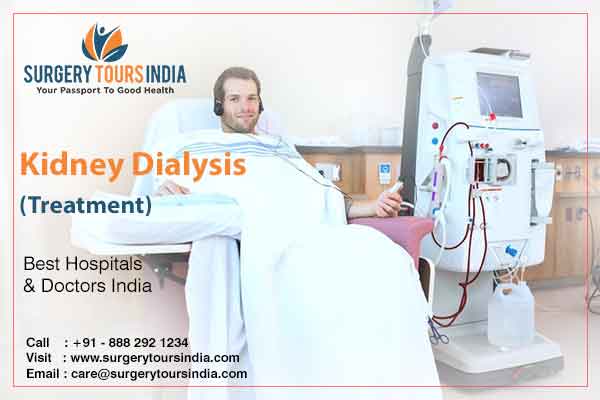
The kidneys are some of the most important pair of organs in the body. They are located at each side of the spinal column and are about the size of your fist. The pair of kidneys functions by filtering out excess fluid and impurities from the blood system.
In some cases, the kidneys' functioning is affected or they stop functioning completely mostly when affected by severe forms of kidney diseases and disorders. In such cases where kidney transplant is not a suitable treatment option the doctor may advise an artificial way of blood filtering known as 'dialysis'.
The medical device used in dialysis helps to filter the impurities from the blood and also helps to keep the body in balance.
Normally, the kidneys function by preventing the excess water and waste from collecting in the body through the blood system. These are also helpful in controlling the blood pressure and the level of important chemicals in the blood. These also produce a form of Vitamin D which is helpful in improving the absorption of excessive calcium from the body.
In case of a severe injury or disease, the kidneys might not be able to perform these functions fully, or at all. The dialysis treatment helps to keep the filtering function going on as normal as possible. If dialysis is not performed as required then the patient may experience several complications, such as excessive levels of salts and other waste products in the body which are harmful to its health.
Dialysis is a temporary resort for compensating for the loss of function in the kidneys. A separate set of treatment will be required to treat the underlying condition.
Dialysis is simply an artificial solution for providing the blood filtering ability to the body when the kidneys do not perform this function.
These are the two methods of dialysis:
This is the most common type of dialysis and uses a device, known as an 'hemodialyzer', to remove the waste and excess chemicals from the blood system and the body.
The doctor needs to make an incision into a major blood vessel, which is then connected with the artificial kidney device and the blood flows through this. This device will then filter more amount of blood.
These treatment sessions are usually for around 3-5 hours and are mostly performed thrice a week. This treatment is performed at a hospital or a kidney-specialist (urological/renal) clinic or at a special dialysis center as well.
If the doctor feels that the patient will likely need dialysis for a long time in the future then they may arrange for the treatment to be done at home on a regular basis.
This is a comparatively extensive procedure which involves performing a surgery to insert a catheter into the abdomen. The treatment involves slowly injecting small amounts of a special compound, known as a 'dialysate', into the abdomen through the catheter. This special chemical is useful for drawing the excessive chemicals and waste from the body and exits the body once the filtering function is done.
Although there are several different approaches for performing a peritoneal dialysis, the most common ones are 'continuous ambulatory peritoneal dialysis' and the 'continuous cycler-assisted peritoneal dialysis'.
Mild Head Injury
Concussion is considered to be a mild head injury and may or may not, be accompanied by loss of consciousness.
In case the diagnostic tests, such as a computerized tomography (CT) scan, results do not indicate any abnormality the child may be discharged after being under observation in the hospital for around 6 hours and also be advised to be observed at home for certain signs and symptoms of severe head injury such as headaches, behavior disturbance, memory loss and disturbed concentration.
In the 'continuous ambulatory peritoneal dialysis' the abdomen is filled with a special fluid and drained several times every day.
In the 'continuous cycler-assisted peritoneal dialysis' the doctor will use a special medical device to help regulate the flow of the fluid into and out of the abdomen. This procedure is usually performed at night when the patient is asleep.
Although, all forms of dialysis treatment are designed to efficiently filter the waste from your body there are several risks that are seen in very rare cases.
With peritoneal dialysis, the catheter inserted inside the abdomen may start to get infected and spread to the incision site and around it inside the abdominal cavity. Peritonitis, an infection that affects the inner lining of the abdomen, is seen in rare cases after a catheter has been implanted inside it.
Other minor risks that are rarely seen in peritoneal dialysis are:
These are the risks that might be seen in rare cases after a hemodialysis is performed:
Although kidney dialysis is not a cure for kidney disorders that cause them to malfunction or quit functioning altogether, it is certainly helpful in continuing the efficient blood filtering process in the body which help to maintain and control and levels of the different chemicals and waste in the body.
Different treatment methods are employed in treating various kidney disorders and an experienced doctor or an urologist can advise on the best-suited treatment method. Dialysis is most helpful in providing temporary filtering solution till the kidneys are healed or replaced (renal/kidney transplant) with a healthy donor kidney.
India is renowned for its vast global-class healthcare resources. It has the world's largest network of high-class hospitals and clinics that are well-equipped with the latest in medical technology. These are world-class healthcare facilities that maintain the highest standards of quality in treatment as well as hospitality services. Surgery Tours India is well-connected with this advanced healthcare network of India and offers every patient with a bespoke treatment package that allows the most affordable and best kidney dialysis in India.
For more information please contact us at
Email: [email protected]
Phone: +91-888 292 1234 / +91-9730 001 540